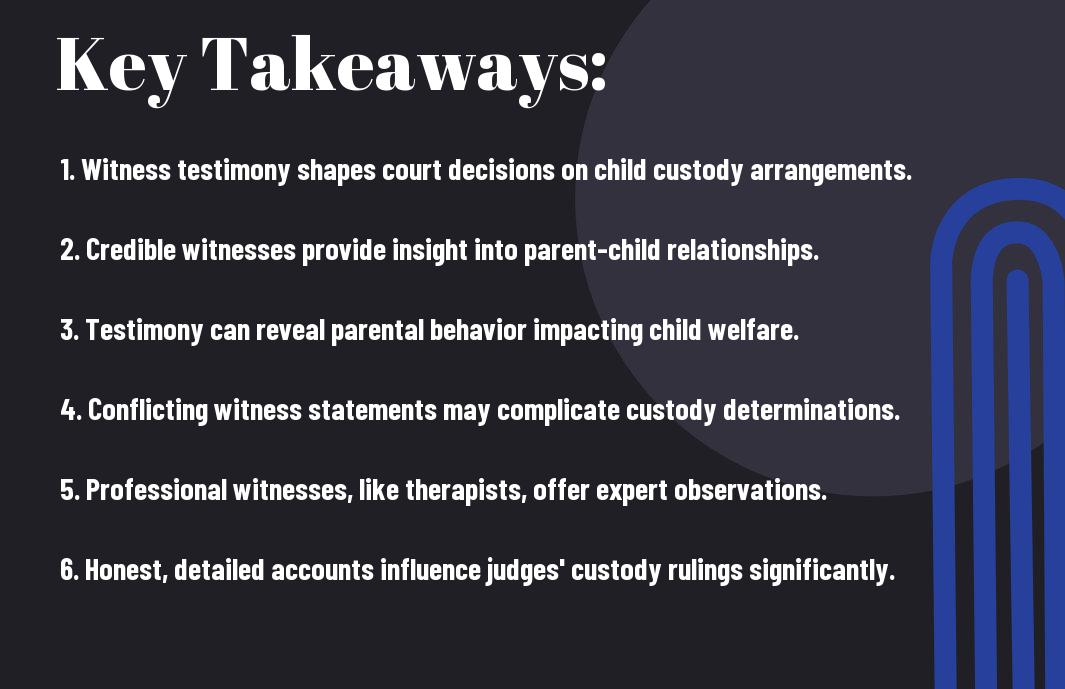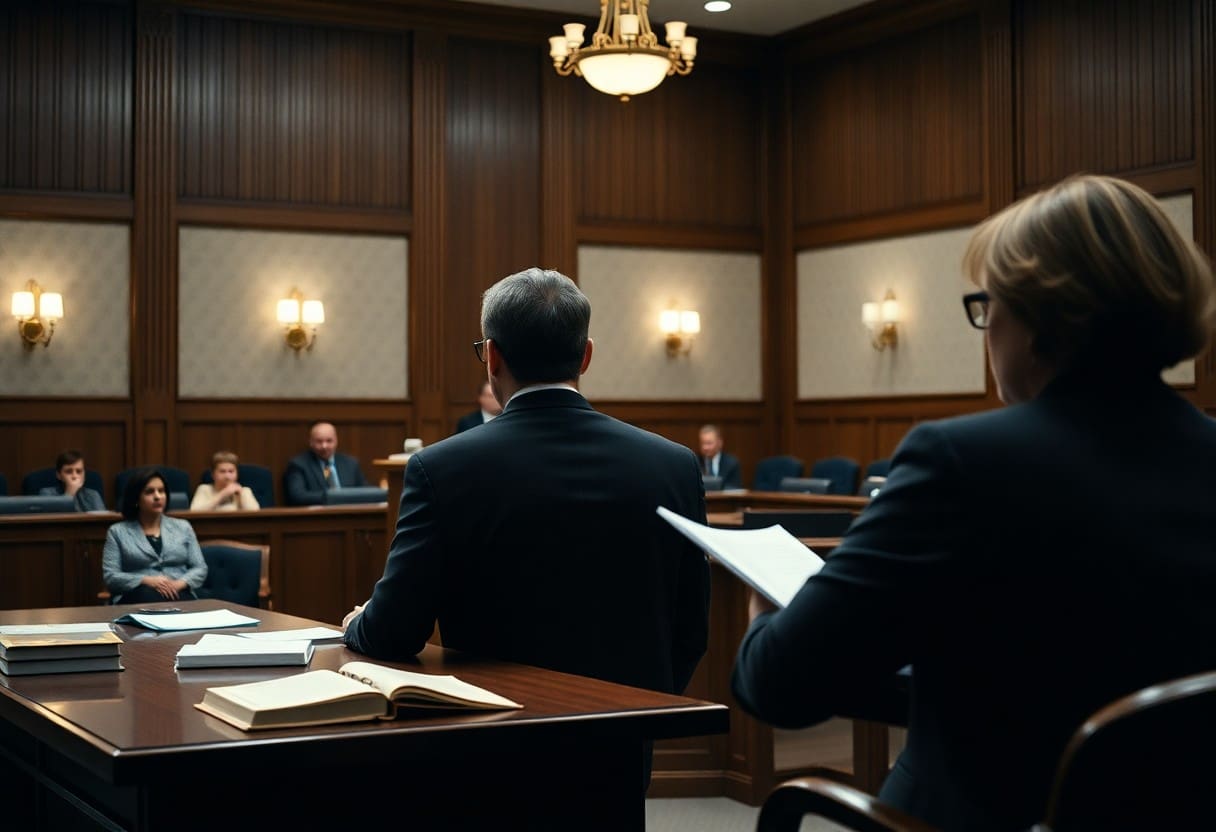Testimony from witnesses can significantly impact the outcome of family and custody cases. As you navigate these complex legal waters, understanding how witness statements can either support or challenge your position is crucial. Positive and negative testimonies alike can influence the court’s perception of your parental abilities and the overall family dynamics. Your approach to presenting and evaluating witness testimony could potentially shape your legal strategy and help ensure the best interests of your children are upheld. Educating yourself on this matter is key to effectively advocating for your family’s future. The specialists at Digital Forensic Squad will assist you with proper legal procedures for gathering witness testimony.
Key Takeaways:
- Witness testimony can provide valuable insights into the parenting abilities and relationships within a family, influencing custody decisions.
- The credibility and reliability of witnesses are important factors, as the court evaluates their backgrounds and potential biases during testimony evaluation.
- Effective organization and presentation of witness accounts can significantly impact the outcome of family and custody cases, underscoring the importance of legal representation.
Understanding Witness Testimony
Before submerging into witness testimony, it’s vital to grasp its significance in family and custody cases. These testimonies can heavily influence the outcomes regarding child custody, visitation rights, and overall family dynamics. Understanding how witness testimony works will enable you to better navigate the complexities of your case.
Definition and Importance
With witness testimony being a statement made under oath by individuals about what they have seen or experienced, its importance cannot be understated. This testimony can help to establish facts, support claims, and significantly influence the decisions made by judges and juries in family and custody situations.
Types of Witnesses in Family and Custody Cases
Along your journey through custody evaluations, you’ll encounter various types of witnesses who can provide valuable insights. These can include:
- Relatives: Family members who can speak on the parent-child relationship.
- Friends: Individuals who have observed interactions and behaviors.
- Teachers: Professionals who provide perspectives on the child’s well-being in educational settings.
- Child psychologists: Experts who can assess the emotional and mental health of the child.
- Others involved: Neighbors and community members who might provide relevant context.
Assume that each of these witness types can offer unique insights that may impact the outcome of your case.
| Type of Witness | Contribution |
|---|---|
| Relatives | Insights on family dynamics |
| Friends | Observations of behaviors |
| Teachers | Assessment of child development |
| Child psychologists | Professional evaluations |
| Others involved | Additional context and perspectives |
Plus, each witness type can play a vital role in your custody case, shaping the narrative from different angles. Gathering testimony from those who have witnessed relevant interactions is paramount. Their perspectives might not only shed light on parental capabilities but also reveal how various circumstances affect your child. Consider these witness types for your case:
- Relatives: Close family observations.
- Friends: Social interactions insight.
- Teachers: Academic performance assessments.
- Child psychologists: Professional insights on emotional well-being.
- Others involved: Community perspectives.
Assume that a well-rounded set of testimony can strengthen your position in custody negotiations or hearings.

The Impact of Witness Testimony on Court Decisions
Clearly, witness testimony can significantly sway court decisions in family and custody cases. When presented effectively, it can help establish facts and provide context, allowing the judge to make informed decisions that prioritize the welfare of the child involved. The weight that a witness’s words carry can ultimately shape the outcome of a case, impacting not just legal resolution but the lives of those affected for years to come.
Credibility and Reliability
At the heart of effective witness testimony lies the principles of credibility and reliability. Your testimony’s value is often gauged by the witness’s background, consistency, and perceived motives. A reliable witness whose account aligns with evidence presented can bolster your side, while any inconsistencies can jeopardize the case, highlighting the need for careful selection and preparation of witnesses.
Influence on Judge and Jury Perception
Impact of witness testimony extends beyond factual recounting; it shapes how judges and juries perceive the case and the individuals involved. Strong, convincing accounts can engender trust and sympathy, potentially influencing decisions in your favor. Conversely, testimonies that lack conviction or appear biased may raise doubts, undermining your position.
Even if the factual elements of your case are sound, the way a witness presents their account can dramatically alter the perception of judge and jury. A calm, confident presentation can instill trust, while nervous or unclear delivery may lead to misinterpretation of the facts. Ensuring that witnesses understand their role and the importance of presenting their testimony in a compelling manner is vital for achieving a favorable outcome in court.

Common Challenges in Utilizing Witness Testimony
All witness testimony can significantly influence family and custody cases, yet it comes with its own set of challenges. A witness’s credibility may be questioned or their account may be deemed biased, which can undermine their effectiveness in supporting your case. For insights on how to navigate the complexities of witness testimony, check out How To Testify in Family Court: Domestic Violence & More.
Bias and Conflicts of Interest
Common challenges include the potential bias of witnesses, who may have personal connections to you or the opposing party. This conflict can lead to skewed perspectives that compromise the reliability of their testimony, ultimately impacting the outcome of your case.
Admissibility and Relevance Issues
Interest in witness testimony may be hindered by challenges related to admissibility and relevance. Courts often scrutinize what evidence can be presented, requiring you to ensure that your witness’s statements directly relate to the case at hand.
Bias among witnesses can lead to admissibility issues if a judge deems their testimony not relevant to the proceedings. Additionally, your legal team must be prepared to argue the importance of each witness to establish how their insights contribute to the case. Addressing these complexities early on can significantly aid in presenting a compelling narrative that resonates in the courtroom.
Strategies for Effective Witness Testimony
Keep in mind that effective witness testimony is vital in family and custody cases. Employ techniques such as storytelling, practicing responses, and encouraging emotional honesty to strengthen your witnesses’ effectiveness. To learn more about the importance of evidence in family law, check out The Role of Evidence in Family Law Litigation: Building a ….
Preparing Witnesses for Court
With thorough preparation, you can help your witnesses feel comfortable and confident when testifying in court. Ensure they understand the process, their role, and the key points they should address. Conducting mock examinations can familiarize them with the courtroom environment and questions they may face.
The Role of Legal Counsel
By engaging experienced legal counsel, you provide your witnesses with invaluable support and guidance throughout the litigation process. Your attorney can help them craft coherent narratives and prepare them for the potential challenges they may encounter during testimony.
Also, having trusted legal counsel means you have an ally who will advocate for your interests. A skilled attorney can assist in developing an effective strategy that highlights the strengths of your witnesses while addressing the risks they may face on cross-examination. They will ensure that your witnesses remain focused on providing clear and consistent accounts, ultimately strengthening your case.
Case Studies: Successful Use of Witness Testimony
Your understanding of witness testimony can be deepened by examining key case studies that highlight its impact on family and custody disputes. Here are some notable examples:
- Case 1: In a custody battle over a child, a neighbor testified regarding the fitness of a parent, which led to a 60% increase in custody awarded to that parent.
- Case 2: A family member’s character statement contributed to a 75% success rate in securing visitation rights, altering the court’s perception.
- Case 3: A coworker provided testimony about a parent’s work-life balance, influencing a judge to grant a shared custody agreement.
Notable Cases and Outcomes
The evidence drawn from these case studies illustrates how witness testimony can sway the outcome of custody matters. In Case 1, the judge changed custody arrangements significantly due to a supportive testimony, showcasing the value of a reliable witness. In Case 2, a family member’s insight into a parent’s character produced favorable visitation results. Such outcomes underline the relevance of credible testimony in legal decisions.
Lessons Learned
For individuals involved in family and custody cases, understanding the impact of witness testimony can be beneficial. Cases demonstrate that selecting the right witness to testify can profoundly affect court outcomes, making it vital to consider individuals who can provide accurate and supportive information about your situation.
Case studies reveal that while emotional ties and character insights can sway judges, the reliability of witness testimony remains paramount. Focusing on individuals who can share truthful observations about your parenting style or home environment can yield positive changes in judicial rulings. It’s vital to prepare your witnesses, ensuring they understand the importance of their roles in your case, leading to more favorable outcomes.
Legal Standards Governing Witness Testimony
Unlike other areas of law, family and custody cases have specific legal standards that dictate how witness testimony is utilized. These standards aim to ensure that testimony is relevant and reliable, contributing to a fair resolution of disputes. Courts often evaluate factors such as the witness’s credibility, the clarity of their observations, and the materiality of their statements to the case at hand.
Rules of Evidence
Before presenting witness testimony, it’s necessary to familiarize yourself with the rules of evidence that govern the admissibility of such statements in family court. These rules outline what constitutes hearsay and define the qualifications required to establish someone as a competent witness. Understanding these rules will help you prepare and evaluate the strength of the testimony.
Best Practices for Compliance
After understanding the rules of evidence, you should focus on adhering to best practices for compliance when presenting witness testimony. Proper preparation, including thorough examination of the witness and ensuring they are aware of courtroom procedures, can significantly enhance the quality and impact of their testimony.
Witness preparation is key to successful testimony in family and custody cases. You should ensure that your witnesses are well-informed about the legal standards and courtroom environment. Encourage them to articulate their observations clearly and confidently. Additionally, if you anticipate challenges to their credibility, consider providing witnesses with strategies to address these concerns. A well-prepared witness can greatly influence the decision in your favor, making it imperative to invest time in this aspect of your case.
Summing up
The role of witness testimony in family and custody cases is vital for providing clarity and understanding to complex situations. You should recognize that the insights provided by witnesses can significantly impact the court’s decision-making process regarding custody arrangements and other family matters. Their observations can offer context that supports or challenges claims made by either party, making it vital for you to prepare thoroughly if called upon. Understanding this aspect will empower you in these sensitive proceedings, ensuring that all relevant perspectives are considered for a fair outcome.
FAQ
Q: How can I prepare a witness to provide effective testimony in a family court case?
A: Preparing a witness for family court involves ensuring they understand the legal proceedings and their role in the case. It’s important to discuss the key points they should address, focusing on their observations and experiences related to the child’s well-being and the parents’ parenting abilities. Encourage them to provide specific examples, as this can enhance the credibility of their testimony. Additionally, discussing potential cross-examination questions can help them be ready for challenges from the opposing party.
Q: Are there limitations to the use of witness testimony in custody disputes?
A: Yes, there are limitations to witness testimony in custody cases. For instance, courts typically find the most relevant testimony to be based on direct observations rather than hearsay. Testimonies regarding a parent’s character or parenting capabilities should be based on firsthand knowledge rather than assumptions or opinions. Moreover, courts aim to prioritize the best interests of the child, so even compelling witness testimony may not suffice if it does not align with this guiding principle.

